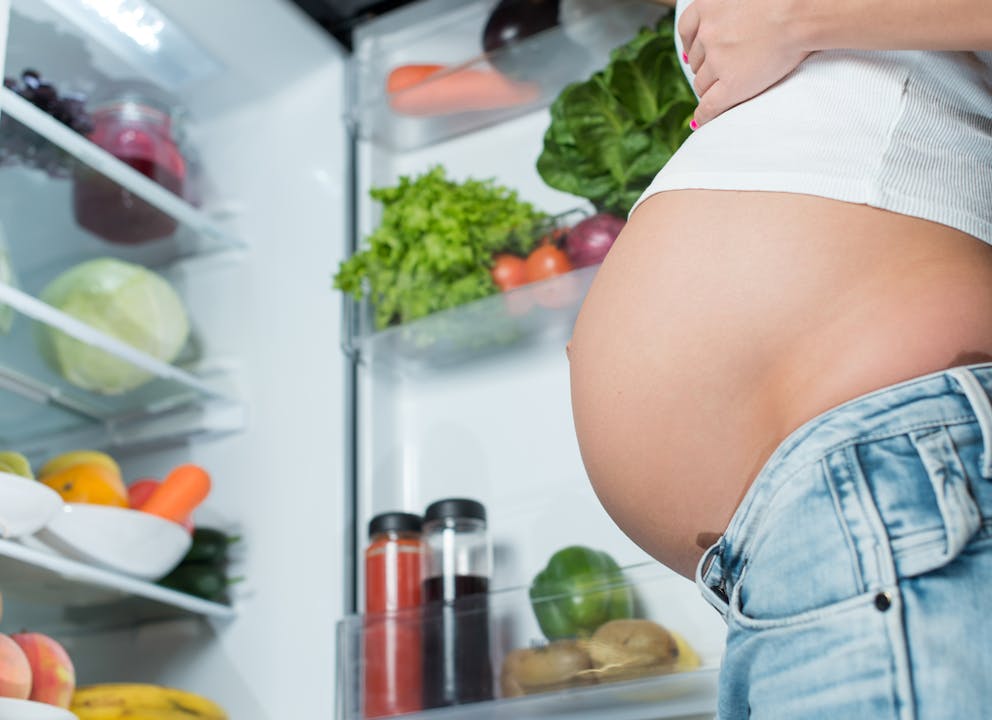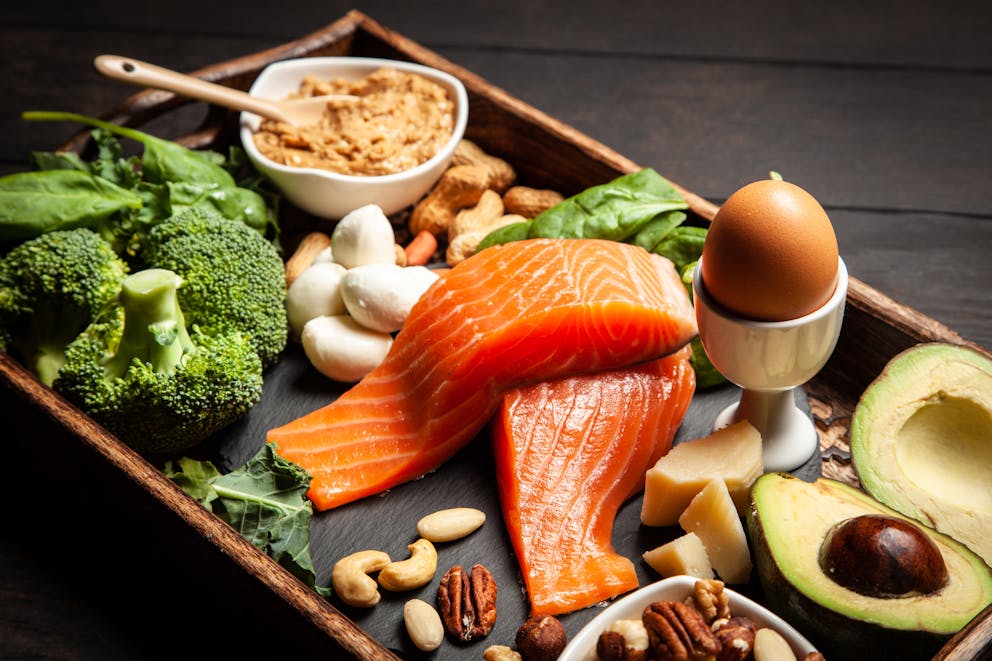Is Intermittent Fasting While Breastfeeding or Pregnant Safe?
While intermittent fasting has many health benefits, it’s not recommended for pregnant or breastfeeding mothers.
The body requires additional calories and nutrients during pregnancy and breastfeeding to support the baby's growth and development. Fasting for extended periods may not provide adequate nourishment and can impact the health of the mother and the baby.
Learn why intermittent fasting while breastfeeding isn’t safe nor is it safe during pregnancy and may interfere with healthy breast milk production.

What is intermittent fasting?
Intermittent fasting involves periods of fasting and eating within a restricted time window.
The 16:8 fast is a popular short-term fasting protocol characterized by a 16-hour fast followed by an eight-hour eating period.
Intermittent fasting has many profound health benefits, and research published in Nutrition Research suggests that fasting has almost identical metabolic effects to calorie restriction—a consistently low intake of calories without causing malnutrition.
Fasting and caloric restriction are linked to longevity and significantly lower risk of heart disease.
However, pregnancy and breastfeeding require additional calories to sustain the child's growth and development, which explains why intermittent fasting isn't suitable for pregnant or nursing moms.
Watch the video to learn why pregnant or breastfeeding women shouldn’t do intermittent fasting.
Is it safe to do intermittent fasting while pregnant?
During pregnancy, adequate nutrition is crucial to support the growth and development of the unborn child.
“The diet of the pregnant woman determines the future health of the unborn child,” explains Dr. Berg. “Fasting can lead to malnutrition in both mother and child, which can cause stunted growth and developmental issues and increases the risk of metabolic disease.”
According to John Hopkins Medicine, women are advised to consume around 300 more calories each day during the second and third trimesters to meet increased energy requirements.
Fasting typically reduces the number of meals, increasing the risk that the mother doesn’t get enough calories to sustain the baby’s growth and energy needs.
Pregnancy also increases the demand for certain nutrients, such as folic acid, iron, calcium, and vitamin C, to support the formation of new cells, tissues, organs, and bones in the developing baby.
Fasting generally reduces food intake, which can contribute to or worsen existing nutrient deficiencies with potentially detrimental health consequences for the mother and baby.

Is it safe to do intermittent fasting while breastfeeding?
A breastfeeding mother needs more calories and nutrients to support breast milk production—the primary source of nutrition for newborn infants that provides numerous benefits for their growth, metabolic health, and immune defenses.
Research published in the Journal of Human Lactation found that fasting can alter breast milk composition, which may impact the baby’s weight gain and nutritional status.
Interestingly, there also is some evidence that short-term fasting doesn’t significantly alter breast milk composition, especially in women with a well-established milk supply.
However, it’s important to remember that the body prioritizes breastmilk production and will draw nutrients from the mother's reserves if dietary nutrient intake is inadequate.
This explains why lactating women without sufficient nutrient intake are at greater risk of nutrient deficiency-related conditions such as anemia, osteoporosis, depression, and a weakened immune system.
It’s best to avoid intermittent fasting while breastfeeding. Prolonged periods of fasting can make it challenging to obtain all nutrients required to support the child's development and maintain the mother's health.

How to lose weight safely while breastfeeding
Breast milk production requires considerate amounts of calories, and lactating women often lose some of their baby weight while breastfeeding.
However, not everyone sheds pregnancy weight quickly, and some mothers are gaining weight while breastfeeding, which can be frustrating and, in fact, may increase the risk of metabolic syndrome and diabetes later in life.
Here are some steps that you can take to lose weight safely while breastfeeding:
Follow a nutritious, low-carb diet
Many pregnant women develop insulin resistance during the third trimester due to hormonal and metabolic changes.
Insulin resistance is characterized by a lack of cellular response to insulin, a crucial metabolic hormone that regulates blood sugar and promotes fat storage.
When cells don’t respond to insulin, the pancreas produces more insulin to compensate for the lack of blood sugar control, leading to elevated insulin levels.
Insulin resistance is a common reason for weight gain or difficulties in losing weight, and consuming carbohydrates and sugars further raises insulin levels which can worsen postpartum weight gain.
Following a nutrient-dense low-carb diet like Healthy Keto® focuses on organic vegetables, full-fat dairy, grass-fed beef, wild-caught fish and game meat, and seeds and nuts while limiting carbohydrates and sugars.
This dietary pattern supports healthy insulin levels, helps reverse postpartum insulin resistance, and provides plenty of nutrients to ensure an adequate supply of nutritious breast milk.
While most breastfeeding women experience positive effects after starting Healthy Keto, others may not benefit from consistent carbohydrate restriction while lactating. Listen to your body and consult a healthcare provider if you feel unwell, suffer dizzy spells, or notice your breastfed infant isn’t gaining weight.

Avoid rapid weight loss
It’s best to aim for a gradual weight loss of one to two pounds per week. Losing more weight can negatively impact milk production and may alter the composition of breast milk.
In addition, shedding fat rapidly can release fat-soluble toxins, which can quickly overwhelm the liver's capacity to safely detoxify and eliminate these compounds.
Research published in Chemosphere found that rapid weight loss causes elevated concentrations of toxins in breast milk, which may increase the risk of neurodevelopmental disorders, stunted growth, and behavioral issues.
Stay hydrated
Breast milk production requires plenty of fluid intake, leaving lactating mothers at risk of dehydration.
Being dehydrated can manifest in sensations of hunger and make you feel lethargic, which can trigger sugar cravings. Snacking and consuming too many calories will counteract the weight-loss effects of breastfeeding.
Incorporate low-impact exercises
Although you may feel tired and worn out after giving birth, starting low-intensity physical activity as soon as possible helps to lose baby weight fast.
Walking, swimming, and gentle yoga or pilates sessions are excellent choices to promote postpartum weight loss without affecting breast milk production.
In fact, a study published in Nature Metabolism found that moderate exercise increases concentrations of health-promoting compounds in breast milk that may reduce the child’s lifelong risk of obesity, diabetes, and heart disease.

Best foods to eat to support a healthy baby
The mother’s diet during pregnancy and breastfeeding has a significant impact on the overall health of the child.
A nutrient-dense diet rich in vitamins, minerals, protein, and healthy fats supports the child's growth and lowers the risk of developmental issues and future health complications.
Here are six foods that support a growing baby.
1. Oily Fish
Oily fish and seafood such as salmon, mackerel, tuna, and shrimp are rich sources of docosahexaenoic acid (DHA), a fatty acid with profound benefits for neuronal development.
DHA is a major structural component of the brain and is particularly important during pregnancy and infancy when the nervous system and brain undergo rapid development.
In addition, DHA is vital for forming the retina, and the lack of adequate DHA increases the risk of impaired visual acuity.
2. Iodine-rich foods
Iodine is a crucial mineral that plays a vital role in the development and function of the baby's thyroid gland, which regulates almost all aspects of the child’s metabolism.
Iodine requirements increase during pregnancy and lactation, leaving mothers at risk of low iodine stores, which can interfere with fetal brain development. In fact, there is evidence that iodine deficiency during pregnancy can impact the child’s IQ.
To meet iodine needs, regularly consume iodine-rich foods such as eggs, seafood, fish, kelp, and dairy products.
3. Eggs
Not only are eggs a rich source of iodine but they’re also packed with several other nutrients that support the developing child's health.
Eggs are an excellent source of protein, the building blocks needed to form cells, tissues, and organs, and they contain various vitamins and minerals necessary for a healthy pregnancy.
Egg yolks are rich in vitamin D, which supports bone formation and immune functions, and vitamins A, E, and B12, folate, iron, and zinc, all of which are important for fetal health.

4. Nutritional Yeast
Nutritional yeast has several nutritional benefits for pregnant women and their growing babies due to its high content of B vitamins.
B vitamins are essential nutrients that play a role in expressing the genetic material needed to form different cell types. They also are crucial for energy production, promote brain development and neurotransmitter production, and are necessary for normal heart function.
Nutritional yeast also contains trace minerals, including zinc, copper, selenium, and manganese—all of which are essential cofactors that regulate metabolic and hormonal pathways needed for fetal development.
5. Leafy green vegetables
Regularly consuming leafy green vegetables such as kale, broccoli, spinach, collard greens, and cabbage during pregnancy or while breastfeeding is an excellent way to obtain essential nutrients that support a healthy baby.
Leafy green veggies are rich sources of folate, a crucial B vitamin that lowers the risk of neural tube defects, and contain several health-promoting phytonutrients and antioxidants.
The placenta nourishes and supports the developing fetus throughout pregnancy. However, this highly oxygenated tissue can be susceptible to oxidative stress, and antioxidants help maintain normal placental function, which ensures optimal nutrient and oxygen supply to the developing baby.
6. Grass-fed beef
Grass-fed beef is an excellent iron source, and regularly eating red meat reduces the risk of iron-deficiency anemia.
During pregnancy, the mother's blood volume increases to meet the growing child's needs. Adequate iron intake supports the production of red blood cells to ensure optimal oxygen transport.
Iron also plays an important role in regulating the muscle tone of the uterus and promotes healthy uterine contractions during birth.

Key takeaways
While intermittent fasting has incredible health benefits, practicing any fasting schedule during pregnancy or while breastfeeding isn’t recommended. Therefore intermittent fasting while breastfeeding should be avoided.
Pregnancy is a time of increased energy and nutritional needs. Fasting typically reduces caloric intake and may contribute to nutrient deficiencies that can have serious health consequences for both mother and the developing child.
To support a healthy baby, focus on a balanced and varied diet rich in nutritious green leafy vegetables, grass-fed beef, oily fish, and iodine-rich foods such as kelp, seafood, and eggs.
FAQ
1. Can I do intermittent fasting while breastfeeding?
Intermittent fasting isn’t recommended during breastfeeding. Breast milk production requires ample calories and nutrients. Fasting typically restricts calories and can contribute to or worsen nutrient deficiencies which can impact breast milk supply and composition.
2. Can I do intermittent fasting while pregnant?
Pregnancy is a time of increased energy and nutrient needs to meet the requirements for fetal development. Fasting generally reduces caloric intake and may not ensure adequate nutrient levels, which can cause issues such as stunted growth and an increased risk of metabolic disease for the child.
3. Does fasting decrease breast milk supply?
Fasting can decrease milk supply due to caloric restriction and may result in inadequate levels of essential nutrients, including vitamins and minerals, which can affect the quality and quantity of breast milk.
4. What is the best intermittent fasting schedule for breastfeeding mothers?
Intermittent fasting isn’t recommended for breastfeeding moms. Pregnancy can contribute to nutrient deficiencies in the mother, and practicing intermittent fasting while breastfeeding can worsen potentially pre-existing nutrient deficiencies, which can impact the health of the mother and baby.
5. What happens if you fast while breastfeeding?
Fasting can decrease milk supply and alter breast milk's composition, resulting in your infant not gaining appropriate weight and increasing the risk of nutrient deficiencies linked to stunted growth and weakened immune defenses.
6. What happens if you fast while pregnant?
Fasting while pregnant can result in a calorie and nutrient deficit that can negatively impact mother and child. Lack of adequate nutrition during pregnancy can interfere with normal fetal development and may increase the risk of neurological, hormonal, and metabolic complications.
7. How can I lose weight fast while breastfeeding?
Following a nutritious low-carb diet like Healthy Keto, avoiding processed foods and sugars, focusing on nutrient-dense foods, and incorporating low-impact exercises into your lifestyle helps to lose weight fast while breastfeeding.
8. Is intermittent fasting good for postpartum weight loss?
Yes, intermittent fasting, in combination with a nutritious low-carb diet, is an excellent way to lose weight postpartum.
However, it’s important to remember that intermittent fasting isn’t recommended during breastfeeding, and it’s best to practice prolonged fasting once the infant has been fully weaned.
Previous blog
Are You on the Ketoish DietTags

Popular
08/21/2024
45.8K views
05/22/2024
40.5K views
11/18/2024
238.2K views
03/18/2024
11/21/2022




